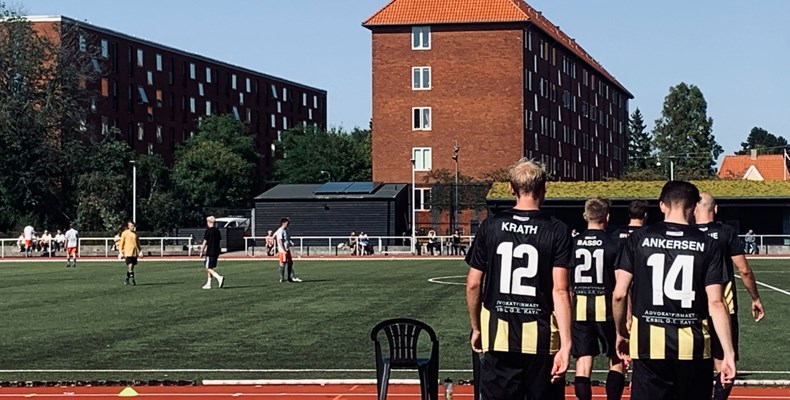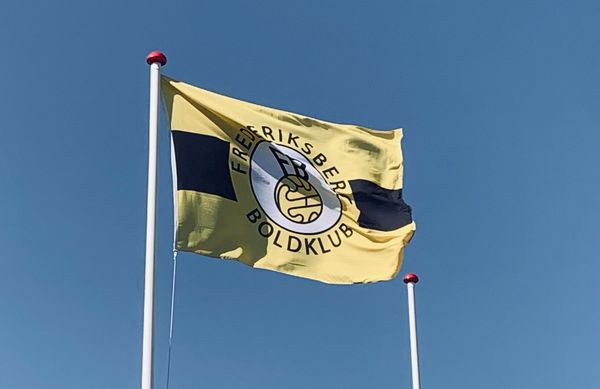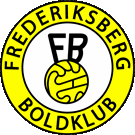Artikel: En sikker havn
 Foto: Will Magee
Foto: Will Magee
Artikel: En sikker havn
Forfatter og fodboldjournalist på Guardian Sport og redaktør på mediet Kult.fc, Will Magee, var tilbage i starten af september måned en tur i Danmark, hvor han som Groundhopper blandt andet aflagde Frederiksberg Stadion et besøg i forbindelse med FB's førsteholdskamp mod BK Viktoria, en kamp som FB vandt med flotte 5-1.
Det er der kommet denne flotte rapport ud af, både via sin egen oplevelse med dagen, kampen og byen, men også ved at interviewe FB's administrerende leder, Martin Busk.
Vi bringer her artiklen i sin helhed:
Walk down the Vesterbrogade, past the countless coffee bars, bike shops and retro furniture stores, and up the sloping Roskildevej, the leafy street which runs straight through the sprawling grounds of Copenhagen Zoo, and the chaotic bustle of the Danish capital makes way for sleepy suburbia. Wander along the wide, open boulevards lined with red-brick apartment blocks and there, behind a small iron gate, lies the Frederiksberg Idrætspark, home to Frederiksberg Boldklub – otherwise known as FB – whose yellow and black flag flutters high above in the wind.
The ground is a jumble of old and new: the immaculate artificial pitch, surrounded by a running track, is overlooked by the towering brick facade of a local school. The main stand houses long rows of creaky wooden benches hand painted in dark green. Halfway along the meandering terrace, dotted with the odd spectator accompanied by a dog, a small electronic scoreboard flashes up with the word “GOAL” whenever the ball hits the back of the net. On warm days in early autumn, in a sandpit intended for long jump practice, kids sit and build sandcastles in the middle of games.
FB share the stadium with FA 2000, who were promoted to the third division last season, while it often hosts high-profile youth games. Kjøbenhavns Boldklub, the team which joined forces with Boldklubben 1903 in 1992 to form FC Copenhagen, now 15-time Danish champions, once played European fixtures at the ground, among them a 3-0 win against Jim McLean’s trailblazing Dundee United side in the UEFA Cup in 1977.
On the surface, FB’s achievements are relatively modest. Founded in 1912 after a meeting organised by eager young players in a cafe on the nearby Finsensvej, the men’s team rose as high as the third division in the sixties but has otherwise bounced around the lower leagues; the women’s side reached the top flight in the nineties, but were not able to stay there. What FB lack in major honours, however, they make up for in their dedication to the ideal of football as a common good. Given their men’s team currently compete in the Copenhagen Series, in the sixth tier of the Danish league pyramid, their community accolades are remarkable: chosen as Denmark’s Football Club of the Year by the Danish Football Association in 2019, they were named Best European Grassroots Club by UEFA in 2020.

FB’s flag flying at the entrance to the Frederiksberg Idrætspark
Those accolades were, in a large part, down to the club’s work with refugees. That started in earnest in 2015 when, amid the extreme violence of the Libyan Civil War, Syrian Civil War, ISIS’s invasion of Iraq and the Taliban insurgency in Afghanistan, a record 1.2m people applied for asylum in the EU. Around 21,000 sought refuge in Denmark despite the government adopting increasingly restrictive asylum policies intended to deter applications. For those arriving in a new country, having experienced extreme stress and trauma, feelings of relief were often tempered by a sense of social isolation.
“At that time the idea about offering them to play football took place,” Martin Busk, FB’s head of operations and development, tells Kult. “The idea was to give them a rest for all the other troubles they had. So we started a football team for both refugees and volunteers, almost one-to-one, so for every refugee, there was a volunteer who took care [of] them, and they could forget a little about other concerns when they played.”
The club teamed up with the Danish Refugee Youth Council, an organisation which supports young refugees settling into life in Denmark, and soon had a men’s squad – half refugees, and half Danish volunteers – of around 30 players. They began training once a week and, before long, started entering into official tournaments. They now play in a local league, with games every weekend. “Through the years [the team] has fallen to about 22 players,” says Busk. “They are all nowadays very much integrated in Danish culture, speak Danish and are much more self-supporting now.”
For a neighbourhood club like FB, being singled out for recognition ahead of thousands of others across Europe remains a huge source of pride. “It was a big honour and a great achievement for us to get that title [from UEFA],” says Busk. “When we won it was across 55 member countries under UEFA, so it was very big.” Regardless, the club hasn’t rested on its laurels. In 2021 they started a team for female refugees which mirrored the men’s set-up. Earlier this year, after gradually building up participation, the team began to train weekly, though they are still working towards contesting competitive games.
The club has also worked with other marginalised groups, making them part of a collective endeavour which includes teams – boys and girls, men and women – of all ages and abilities. “We have two times a week football for older men with heart and diabetes challenges, where movement and exercise is a very important method to keep them going from sickness,” says Busk. “We also offer a camp for socially disadvantaged children and young people once a year, in co-operation with the municipality and the residential areas [around us], and we also [aspire to] football for other vulnerable groups like disabled or lonely people.”
Take in a first-team match at the Frederiksberg Idrætspark alongside a few hundred spectators in yellow and black, and it would be easy to assume it was a small community club like any other. In some ways, it is: in a football-mad city, with pitches spread across teeming public parks like Fælledparken and Kløvermarken in the north and Valbyparken in the south, there are dozens of similarly sized clubs with deep roots in their local area. While many choose to spend their Saturdays cheering on FC Copenhagen or Brøndby, their fierce rivals, countless others volunteer, play for and support a side just around the corner. The city’s football culture is as much about clubs in the Copenhagen Series, many of which run dozens of teams at all levels, as it is about Champions League fixtures under the lights at Parken.
Even so, FB showcase the best of community football in Copenhagen. “We want to take more social responsibility and not just be a football club where we offer the normal football practice two or three times a week,” says Busk. “It’s very important for us to be a bit more local than just that. It’s one of the great things being in our club. We are for everyone and that’s not just a slogan, it’s also in our DNA. It’s about resources and, when it comes to those who haven’t got them, it’s important for us to be there and help the weakest also. We want to make a difference, small or big, and that’s among the things that keep us going.”

